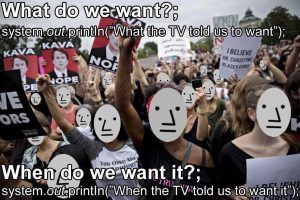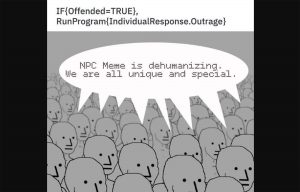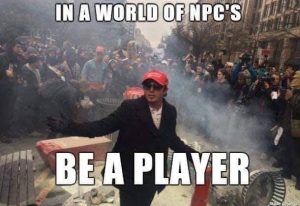by Scott F. Aikin and Robert B. Talisse

The advent of the NPC meme is curious. It’s used as a term of abuse in comment-exchanges, it has occasioned some deep hermeneutics from the cultural Left, and it’s been a cause for escalation particularly by the extreme Right. The political meme of the NPC comes from the world of gaming. It is an abbreviation of non-player character. The point of non-player characters is that they are part of a story being told for the point of the game – a person in need of help, a bartender with some information, or an opponent with a challenge. In tabletop gaming, such as Dungeons and Dragons, the NPCs are played by the Dungeon Master. In that case, there was still an interested human driving the actions of the NPCs. But with electronic games, the NPCs are directed by the computer. They have no inner life nor are they avatars for those who have them. They are merely furniture in the world of the game. Their purpose is to be there to be soaked for information, helped so that they may confer some boon, or vanquished for some treasure, as the case may be. But they have no value or purpose beyond being a foil with which players may tell their own stories.
The application of the term NPC in contemporary internet culture is predicated on the divide between player character and non-player characters. Player characters develop, and they are reasons for which the game world exists. Non-player characters are static, predictable, and mindless; again, they are mere instruments within that world. The division, then, is between those characters who, on the one hand, are conscious, have minds, and can deliberate about what they wish to do, and on the other hand, those characters who are mindless, unconscious, and do not (and perhaps cannot) deliberate about their purposes. NPCs are, then, tools, and players are those who may use them as they see fit.
It is a familiar distinction, in a sense. The old division between those who are asleep and those who are awake is one ancestor. Further, the old term of abuse ‘sheeple’ invokes the idea that there is a less-than-aware group who is systematically misled because of their incapacities or credulity. In fact, the rhetorical force of most consciousness-raising programs requires some such contrast. Enlightenment, for example, contrasts with those who labor in darkness. Being woke contrasts, again, with the slumbering. Those who have been raised up are brought out of a lower consciousness. That’s what consciousness raising is and must be. These metaphors all entail that a change has occurred, one between two contrary states of mind.
When it shows up in online political discussion, the metaphor of the NPC invokes much of the same imagery, but there is something distinctive about it. It has a different valence in that the NPC is not a fallen or deficient consciousness, one that labors in darkness or slumbers in ignorance. Instead, an NPC is not conscious at all, and further incapable of consciousness. In light of this, consider the use of the NPC metaphor in the INFOWARS contest for best NPC meme. NPC’s are all faceless (or better: all with the same basic face, but without individuality), and all are representatives of the same liberal viewpoint. They all act out of their programming – saying the same thing at the same time, reacting with the same officious-to-violent acts when players fail to fall in line. The great irony is that the span of NPC characters ranges from peacenick ‘cucks’ to violent ‘antifucks’, but they all are nonetheless of a single mind, from the alt-right-meets-Alex-Jones viewpoint. The lesson, of course, is that if you are willing to believe that ‘they are turning the frogs gay,’ then a good deal of the rest of the world will appear to be not merely a bunch of ‘normies,’ but perhaps not even conscious at all.
It is an easy connection to make between the idea that socialization is programming and the idea that people are simply programs being played out. This is the idea of the NPC – that the world has other people in it who are merely furniture. They are programmed to say things, to react, and sometimes even to fight the players in that world, but they have no purposes beyond that or capacity to reflect on themselves and the broader facts in their world.
The NPC, from this perspective, is not a morally considerable entity. It is something to be used for one’s own purposes to overcome in order to advance one’s story. But all this assumes that one is, then, the player – the one for whom the game, its programming, rules, and NPCs exist.

One objection to the use of the NPC metaphor in political discourse is that it dehumanizes one’s political opposition. In some ways, this objection is just a restatement of what the point of the NPC abuse is. For sure, it does that, and it does that precisely for that purpose. And equally for sure, this is an objection to treating others as means only, but if the objection’s audience does not recognize those others as others, it’s not much of a recognizable objection as stated. From the player’s perspective, an NPC complaining that the player treats them merely as an object is equivalent to the sound of a chair squeaking when you sit in it.
A further objection, but one that may have some bite, is that the contrast between players and NPC’s places those who wield the metaphor in the middle of their world, as its purpose. Those who call others NPC’s imply that they themselves are the players. Think of the narcissism at the core of this thought, and consider the certainty that one must be right about so much that one must have for this to be an appealing way to think of others with whom one disagrees. Think further about what it would take for one to say it out loud to those others. One would have to think the following: either they don’t have views at all, or that their views don’t matter. Either way, one’s take on the situation is the only thing worth saying. But the problem arises – who else is really a player? Are you alone in this game, surrounded only by NPC’s? Even those who say the same things as you could be programmed to do so. Once one’s given in to this line of thought, one has retreated to a form of solipsism – that one is the only thing that is or that matters. The trouble is that this viewpoint is clearly self-defeating as a political viewpoint, since its message must be of the form: since solipsism is true, more people should be solipsists.
In last month’s column, we identified civic enmity as the condition where democratic citizens are incapable of seeing their political opposition as political equals. When civic enmity reigns, citizens see their rivals as wielders of an equal degree political power, but not as political equals who are thereby entitled to an equal share of power. Surely one way to affirm the idea that those with whom one disagrees politically are therefore political subordinates and accordingly unfit for citizenship is to cast them as non-players in the democratic endeavor. The consequence then is that the NPC meme is a form of civic enmity that has at its core an obviously self-defeating civic solipsism.
